A fighting game is a genre of video game that involves combat between two or more characters. Fighting game combat often features mechanics such as blocking, grappling, counter-attacking, and chaining attacks together into "combos". Characters generally engage in battle using hand-to-hand combat—often some form of martial arts. The fighting game genre is related to, but distinct from, the beat 'em up genre, which pits large numbers of computer-controlled enemies against one or more player characters.
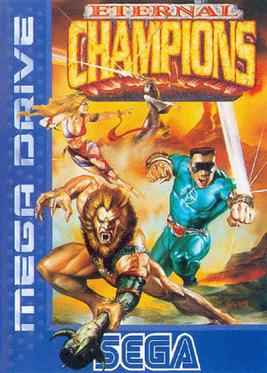
Eternal Champions is a 1993 fighting game developed and published by Sega for the Sega Genesis. It was one of the few fighting games of its time developed from the ground up as a home console title, rather than being released in arcades first and later ported to home systems.
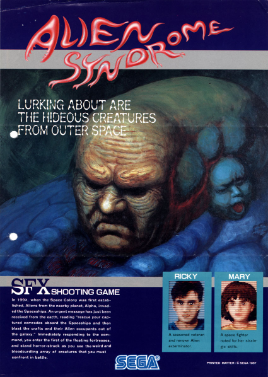
Alien Syndrome is a run and gun video game developed by Sega and released in arcades in 1987, and later ported to the Master System in 1988. The game utilizes a side-scrolling feature that allows the player to take control of either a male (Ricky) or female (Mary) soldier whilst hunting aliens and saving hostages before they run out of time.

Shinobi (忍) is a side-scrolling hack and slash video game produced by Sega, originally released for arcades on the Sega System 16 board in 1987. The player controls ninja Joe Musashi, to stop the Zeed terrorist organization from kidnapping students of his clan.
A sports video game is a video game that simulates the practice of sports. Most sports have been recreated with video games, including team sports, track and field, extreme sports, and combat sports. Some games emphasize playing the sport, whilst others emphasize strategy and sport management. Some, such as Need for Speed, Arch Rivals and Punch-Out!!, satirize the sport for comic effect. This genre has been popular throughout the history of video games and is competitive, just like real-world sports. A number of game series feature the names and characteristics of real teams and players, and are updated annually to reflect real-world changes. The sports genre is one of the oldest genres in gaming history.

Out Run is an arcade driving video game released by Sega in September 1986. It is known for its pioneering hardware and graphics, nonlinear gameplay, a selectable soundtrack with music composed by Hiroshi Kawaguchi, and the hydraulic motion simulator deluxe arcade cabinet. The goal is to avoid traffic and reach one of five destinations.
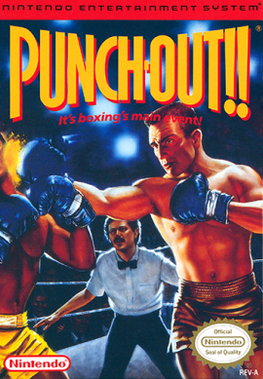
Punch-Out!!, originally titled Mike Tyson's Punch-Out!!, is a 1987 boxing video game developed and published by Nintendo for the Nintendo Entertainment System (NES). Part of the Punch-Out!! series, it is an adaptation of the arcade video games Punch-Out!! (1984) and Super Punch-Out!! (1984). Differences from the arcades include the addition of undisputed world heavyweight champion Mike Tyson as the final boss. It received critical acclaim, and is retrospectively considered one of the greatest video games of all time.

Kung-Fu Master, known as Spartan X in Japan, is a side-scrolling beat 'em up developed by Irem as an arcade video game in 1984, and distributed by Data East in North America. Designed by Takashi Nishiyama, the game was based on Hong Kong martial arts films. It is a loose adaptation of the Jackie Chan, Sammo Hung, and Yuen Biao film Wheels on Meals (1984), called Spartan X in Japan, with the protagonist Thomas named after Jackie Chan's character in the film. The game is also heavily inspired by the Bruce Lee film Game of Death (1972), which was the basis for the game's concept. Nishiyama, who had previously designed the side-scrolling shooter Moon Patrol (1982), combined fighting elements with a shoot 'em up gameplay rhythm. Irem and Data East exported the game to the West without the Spartan X license.

Nekketsu Kōha Kunio-kun, released as Renegade in the West, is a beat 'em up video game developed by Technōs Japan and distributed by Taito for the arcades in 1986. In the original Japanese version Nekketsu Kōha Kunio-kun, the game revolves around a high-school delinquent named Kunio-kun who must stand up against a series of rival gangs frequently targeting his classmate Hiroshi. In the Western version Renegade, the player controls a street brawler who must face four different gangs in order to rescue his girlfriend being held captive by a mob boss.
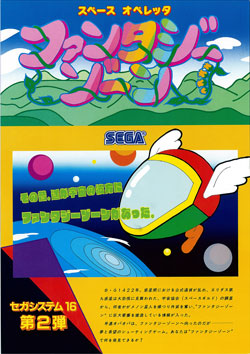
Fantasy Zone is a 1986 arcade video game by Sega, and the first game in the Fantasy Zone series. It was later ported to a wide variety of consoles, including the Master System. The player controls a sentient spaceship named Opa-Opa who fights an enemy invasion in the titular group of planets. The game contains a number of features atypical of the traditional scrolling shooter. The main character, Opa-Opa, is sometimes referred to as Sega's first mascot character.

Arch Rivals is a basketball video game released by Midway for arcades in 1989. Billed by Midway as "A Basket Brawl", the game features two-on-two full court basketball games in which players are encouraged to punch opposing players and steal the ball from them. Arch Rivals was the second basketball video game released by Midway, sixteen years after TV Basketball (1974). Home versions of the game were released for the Nintendo Entertainment System, Genesis/Mega Drive, and Game Gear.

Yie Ar Kung-Fu is an arcade fighting game developed and published by Konami. It first had a limited Japanese release in October 1984, before having a wide release nationwide in January 1985 and then internationally in March. Along with Karate Champ (1984), which influenced Yie-Ar Kung Fu, it is one of the games that established the basis for modern fighting games.

Double Dragon is a 1987 beat 'em up video game developed by Technōs Japan and distributed by Taito for arcades across Asia, North America and Europe. It is the first title in the Double Dragon franchise. The game's development was led by Yoshihisa Kishimoto, and it is a spiritual and technological successor to Technos' earlier beat 'em up, Nekketsu Kōha Kunio-kun (1986), released outside of Japan by Taito as Renegade; Kishimoto originally envisioned it as a direct sequel and part of the Kunio-kun series, before making it a new game with a different cast and setting.
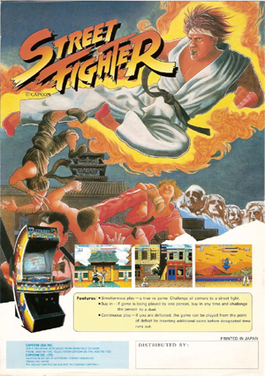
Street Fighter is a 1987 arcade video game by Japanese developer and publisher Capcom. It is the first competitive fighting game produced by the company and the first installment in the Street Fighter series. It was a commercial success in arcades and introduced special attacks and some of the conventions made standard in later fighting games, such as the six-button controls and the use of command-based special moves.

Teenage Mutant Ninja Turtles: Tournament Fighters, or Teenage Mutant Hero Turtles: Tournament Fighters in Europe, is the title of three different fighting games based on the Teenage Mutant Ninja Turtles, produced by Konami for the Nintendo Entertainment System, Sega Genesis, and Super NES and released during a period between 1993 and 1994. Konami produced a different fighting game based on the franchise each featuring a differing cast of characters for the platforms. All three versions of the game were re-released as part of Teenage Mutant Ninja Turtles: The Cowabunga Collection in 2022. with online play using rollback netcode for the SNES version of the game.

Batman Forever is a beat 'em up video game based on the film of the same name. Though released by the same publisher at roughly the same time, it is an entirely different game from Batman Forever: The Arcade Game. The game was followed by Batman & Robin in 1998.

Pro Wrestling, known as Gokuaku Doumei Dump Matsumoto in Japan, is a professional wrestling video game released for the Master System in 1986 by Sega. It centers around tag team wrestling, with four duos that players can select and guide to various championship titles around the world. Pro Wrestling was the only professional wrestling title released for the Master System in United States. The game has received mixed reviews, with publications criticizing the game's graphics and controls.
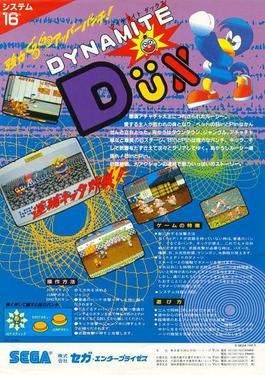
Dynamite Düx is a beat 'em up developed by Sega AM2 and released by Sega as an arcade video game in 1988. Produced by Yu Suzuki and with music composed by Hiroshi Kawaguchi, the game uses the Sega System 16 arcade board, the same board used for Golden Axe and Altered Beast. It was ported to the Master System, Amiga, Amstrad CPC, Atari ST, Commodore 64, and ZX Spectrum platforms in the following year. A Mega Drive version was planned but never released.
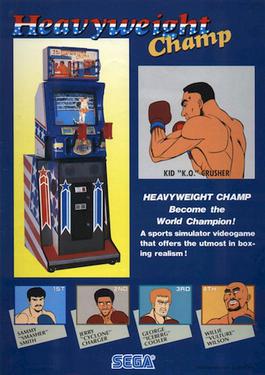
Heavyweight Champ is a series of boxing video games from Sega. The original arcade video game was released in 1976. The game uses black-and-white graphics and critics have since identified it as the first video game to feature hand-to-hand fighting. It was a commercial success in Japan, where it was the third highest-grossing arcade video game of 1976. However, it is now considered a lost video game.
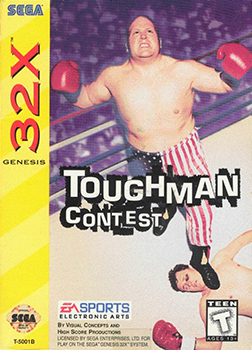
Toughman Contest is a boxing video game for the Sega Genesis and 32X. It is based on the Toughman Contest, and features Eric "Butterbean" Esch on the cover and as the game's final boss. The game was released in 1995. It received mixed reviews, generally criticizing the sluggishness of the gameplay while praising the selection of special moves.
















